One day, I walked in to see my mother, just staring at this rose. I blinked. “Ma, What are you doing?”
“Have you ever looked at a rose,” she asked, “long enough to see it open?” She didn’t take her eyes off of it. “It is so beautiful. You have to do it.”
I get my love of nature from her. When she was in her early twenties, she camped across Canada, all by herself. She always loved gardening, loved flowers. I’ve really become flower obsessed too. Maybe it’s an age thing, I don’t know. She was surrounded by an abundance of all types of flowers on the Azores Islands, where she grew up. The youngest of six, she was curious, quiet. She loved being with her family. They were tight-knit, always together—a big gang of family and friends, going to carnival, dinners and festas. She would tell me beautiful stories about being surrounded by the people she loved in the enchanting Azores, so close to Gorreana, the original tea plantation of Europe. Being an island, everyone knew each other. Through her, I have come to love that island too. I return every year.
When she was thirteen, her family moved to Canada. It was a hard adjustment, being in this vast, new country and not knowing the language. She was depressed, eating ice cream while she watched episodes of Sesame Street, eventually teaching herself English. Gradually, she came out into her own. Gained her voice.
She had all four of us by the age of thirty-two. As the main breadwinner of the family, she was working twelve-hour shifts as a nurse, just trying to make ends meet. I always saw her in nursing scrubs. I remember seeing her sitting on her bed, exhausted, but always holding a book on her lap. She was very much a reader—always a stack of books on the go. I’d ask her a million questions: what she loved, what she disliked, what she thought about love, God, purpose and every other question imaginable, just to spend time with her. She had a lot of opinions. A lot of insight. She was a very deep woman, but she also loved to have fun.
She loved to laugh and we all loved to hear it. I remember, one time we were in church. This was before I made up my mind that I would never go again (due to a comment made against gay marriage). I think I was thirteen at the time. We were sitting there, and the offering basket was going around. I made it obvious that I was going to give money, holding my hand aloft. And it just wouldn’t come to me. Finally, my mom whispered in my ear, “Well, they figured you needed it more than they did!” I started laughing. We both laughed so hard, tears streaming down our faces in the middle of mass. The others glared, but we just couldn’t control it.
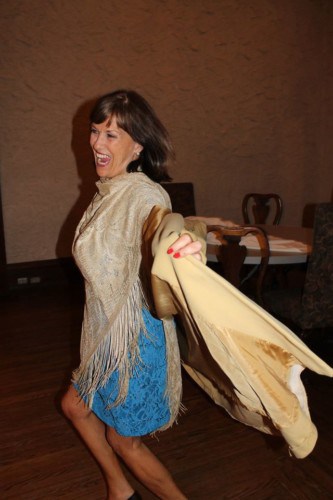
She also loved to dance, and some of my fondest memories are of us are dancing together. We would dance a routine to “Into The Mystic” by Van Morrison. I asked her what she always wanted to be. She said she loved nursing, but her dream as a young woman was to be a lawyer, or a dancer. When you see pictures of her dancing, she’s in complete happiness.
She was very elegant and lit up any room she walked into. She had this walk—this strut—confident, yet playful. For her, it was always about being strong. She had to deal with a lot, but she didn’t have time to think about anything else. She worked so hard. One day, when I was thirteen, I was upset and giving her attitude. We used to talk a lot and we weren’t spending a lot of time together. I missed her and wanted her attention. She just looked at me and said, “I know I’m your mother, but I’m also a woman.” It was an eye-opener. I thought, “Oh right. You ARE a woman, you have these desires and hopes.” This struck me. It made me really look at her needs rather than just mine. It made me question the roles we play in each others’ lives.
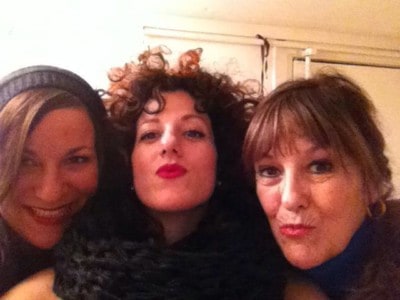
She was a very kind and considerate woman. When she asked how you were, she really meant it. At the same time, if she felt someone did something wrong—even if she didn’t know you—she would say something. She was quite direct. She would fight for people, and would even go against doctors if she had to. She was a real ballsy woman.
I think my relationship with her changed when I reached my early twenties. I was growing into being my own woman and having my own thoughts about things. We wouldn’t always see eye-to-eye, yet we were very much alike. My life got so busy; it became all about music and trying to survive. She supported me the best way she knew how. She said, “I know I’m your mom, but I’m not here to tell you what to do. I’m here to guide you. It’s your life.” She always made me feel free.
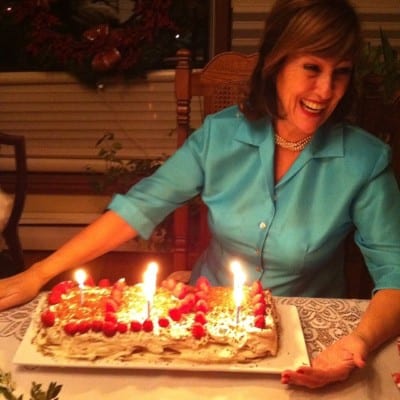
She always told me that she loved her job, loved going to work, loved her life. If you saw her retirement celebration, she looked happy and healthy, dancing away. A year later, she did the El Camino walk. She drank some of the fountain water and says she caught pneumonia. When she came back, she said she was having breathing problems. Before this, I was having a lot of dreams about her, and my intuition was constantly pulling at me. I called and asked, “Is everything okay?” Everything was fine, she insisted. Just a little pneumonia. Coincidentally, I was heading back to North America for work, so I made a point to go home for a visit.
When I arrived at the hospital, she was propped up in bed, eating and drinking. But she insisted I go to Seattle to the conference. I left, but I shouldn’t have. I have regret about it to this day. When I was away, she got worse. She had to be intubated. When I arrived, she was tied to the fucking bed. I was furious. My mom was a nurse for thirty years and had always put so much care into her patients. When families would visit, she would do their hair and put on lipstick, make sure they felt good and clean. Patients adored her because she cared about them and didn’t just see a sick patient. Yet there she was tied to the bed. I untied the wraps and she reached for the tubes right away, trying to pull them out. I reached for her hand and told her it was okay, that I loved her. She went back to sleep and I sat there watching her. She never wanted to be intubated, but we still needed to find out what was wrong with her and see if we could do something about it.
We would play music for her and she’d move her feet. She couldn’t talk. She had the oxygen mask on, but she was basically drowning. This weighs heavy on my heart. I hate that she suffered. We found out she had stage 4 lung cancer. When they took out the tubes, we could see her struggle and then a calm came over her. She died within ten minutes. We didn’t expect her to go so fast. I remember looking at her, smiling and saying, “Hi Mom,” with the biggest smile I could muster up, and she smiled back with that iconic, magnificent Catarina smile. That’s how I remember her.
She was sixty-three years young.
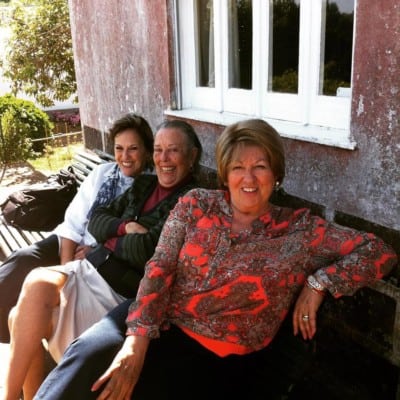
The thing about it all is: We are all going to experience losing someone we love, and none of us are prepared. Grief is taboo. It’s like mental illness. People don’t talk about grief and they feel uncomfortable and they don’t know how to handle it. You have to learn to cope in front of other people, because they’re more uncomfortable with it than you are. But it’s always there. This empty space that will never be filled. I can hear my mom saying, “Life goes on, lovey.” There are parts of my life that are more beautiful, because now there’s a layer of deep sorrow that brings out this vulnerability. But it’s not the same and it never will be. It is ineffable to describe how painful it is. Even after three years, I am still processing.
She chose to have her celebration of life two weeks after she died. It was around Easter, her favourite time and very symbolic for her and her faith. The church was filled with people, and we had a nice gathering at a local restaurant in London. Music, videos, and I sang “Ave Maria,” as she requested. At the celebration of life, there was a young nurse who came to me and said, “I came from Chicago to be here, and I wanted to let you know that your mom taught me how to be a nurse that cared about her patients like I would my own family. She changed my life.” Story after story, revealing her big heart.
My mother taught me to be kind. To always stand up for people who didn’t have a voice. To be independent and to work towards your passion. To always give and have compassion. We always had hot water and food on the table, but it was tough in the early years. But no matter what, she always found a way to give back. I know she did the best she could, and I believe all mothers do. I am so grateful to have had her as a mom.
After she died, I was a wreck. I couldn’t do much and stayed quiet most of the time. My mom and I always talked about life and death. She would say, “Energy is constant, my love. It cannot be destroyed nor created. I’ll always be around.” I started seeing butterflies, weirdly enough. They would land on me. I’d wake up and there would be a butterfly above my bed. I could walk up to one—my face inches away—and watch it open and close its brilliant wings.
She always said she’d show up, somehow, someway.
Suzana Barbosa is the founder of Arthost, a platform aimed at democratizing artist residency spaces so more artists can create, doing what they love. Currently residing in Copenhagen, Barbosa is doing her Masters in Strategic Design and Entrepreneurship, with a minor in sustainability. As a project manager for the University Startup World Cup, she will bring together forty teams from across the globe together to pitch their sustainable startup ideas. She is passionate about music, teaching, solving problems using ethnography, creativity, play and strategy design to help make the world a more sustainable place for us all. She wants to utilize entrepreneurship, design and biomimicry to solve planetary problems, we as a society currently face.


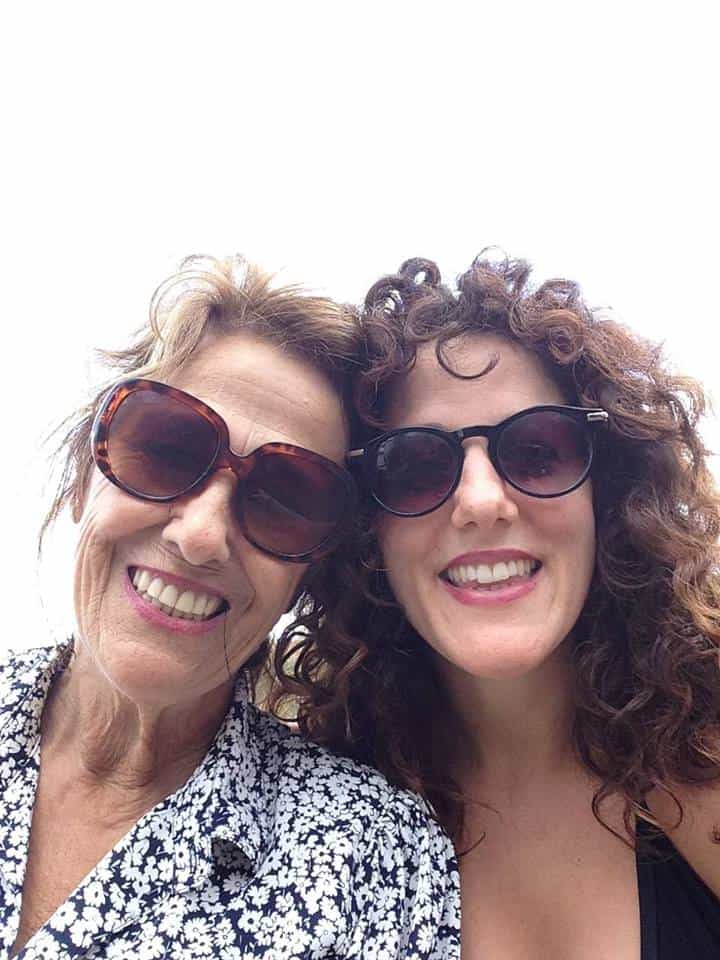
 Follow Us On Instagram
Follow Us On Instagram
